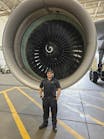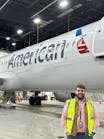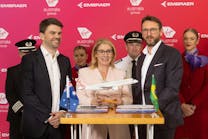Nov. 10--Larry Chappell is one of those guys who schlepps through airports several times a month on business trips.
As a sales rep for a local corporation, he often flies to Atlanta and Montreal, for instance. So he needs to know the best fares airlines offer.
"That's why I need to see all my options," said Chappell, of Cranberry. "If they didn't send me those options, I'd be screwed."
He and countless fliers could be inconvenienced, or worse, if an industry proposal is adopted that would likely hide some flight options and lowest fares from consumers.
The International Air Transport Association, which represents 240 carriers worldwide, is pushing an industry standard that would let airlines customize flight plans and fares to individual passengers. But those fares would be supplied only if passengers provide personal information.
"The airlines say they want all this information to personalize their offers to you, but it's really a way of determining how much you're willing to pay," said Kevin Mitchell, chairman of the Business Travel Coalition in Radnor, one of several advocacy groups actively opposing the proposal.
A computer technician in Pittsburgh, for example, might need to fly to Phoenix every two weeks to see a client. If that passenger must provide such business travel information to an airline in order to get a fare, "it's like having a target on your back," Mitchell said.
"The airlines are trying to eliminate the ability of (online agencies) like Expedia or Travelocity or Price-line to display all the fares in a matrix where you can compare," said Charlie Leocha, director and founder of Consumer Travel Alliance in Springfield, Va.
"I probably fly about 30 times a year, to a lot of different cities," said Charles Bostick, a Cupertino, Calif., architect visiting Pittsburgh on business recently.
"And I always try to get the best fares," said Bostick, who uses online travel sites.
About 60 percent of airline ticket sales are transacted by travel agents and online travel agencies, according to the association representing carriers.
Aside from passengers and travel agencies, other players could be affected. Car rental agencies, hotels, passenger rail and cruise lines would have to cooperate with the airlines' model if they wanted to be a part of passengers' travel plans, Mitchell said.
Providing one's personal information is nothing new, as online shoppers know -- especially those who receive marketing pitches obviously based on their demographics and purchasing habits. Plus, big airlines are developing systems that will allow them to mine data, such as in-flight purchasing habits and frequent flier records, that they may already have on some passengers.
But detractors of the global transport association's proposal find it disturbing that airlines could pick and choose which flight and fare options to offer passengers, depending on demographics and travel habits.
The association's proposed system is called the "New Distribution Capability." The association revealed the global initiative at an industry conference in Geneva in 2011.
Spokesman Peter Flint said the proposal is a "technical standard" that airlines are not obliged to adopt. Airlines, and not the association, decide fares and how to distribute that information, he pointed out.
Flint defended airlines' desire to personalize travel offers and fares according to information travelers supply: "How is it different from retailers that have 'clubs' that you have to join to receive special offers and prices?"
Airlines for America, an industry group of the 11 largest U.S. carriers, endorses the proposal. Its members include US Airways and Delta Air Lines, which offer the most nonstops from Pittsburgh International Airport.
Matt Miller, a spokesmen for American Airlines, US Airways' merger partner, said the airline could not comment on fare-related matters. US Airways spokesman Andrew Christie and Delta spokesman Paul Skrbec declined to comment.
The Department of Transportation and regulators in European Union countries are reviewing the proposal. The U.S. agency's review should be completed by year's end, said spokesman Bill Mosley, who would not speculate about its prospects for approval.
"They (airlines) are just trying to make more money," said business traveler Chappell.
He spurns airlines for 20 or so business trips to Toronto a year -- instead, driving more than four hours each way -- because the Pittsburgh-Toronto flight costs about $1,200.
But the transport association insists airlines need the New Distribution Capability and the tech standards that support it. Some airline reservations systems and travel agent technology are too antiquated to support today's "robust/complex" offers, including WiFi connectivity, meal choices and extra leg room, the group said.
Business traveler advocate Mitchell counters that no consumer segment other than banking requires personal information before quoting prices for products or services.
"And that's because a bank needs to know about you so it can determine whether to take you on as a risk before it grants you a loan," Mitchell said.
The groups opposing the proposal are trying to work with the global airline organization to modify its plans, said Christoph Klenner, secretary general of the European Technology & Travel Services Association.
They favor technological innovation, said Klenner, as long as travel agents and related businesses can access all airline schedules, fees and fares so that people can shop for deals.


